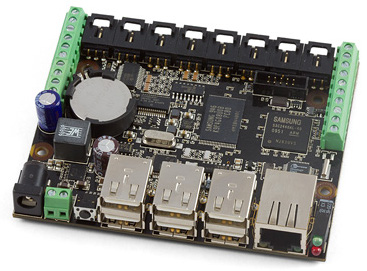Sensor-oriented ARM9 SBC speeds up, gains I/O
Feb 4, 2011 — by Eric Brown — from the LinuxDevices Archive — 1 viewsPhidgets is shipping a faster, more I/O-rich version of its Debian Linux-based single board computer (SBC) for sensing and control applications. The PhidgetSBC2 cranks up its ARM9-based Samsung SC32410 processor to 400MHz, boosts flash memory to 512MB, and increases USB connectivity to six ports, while still offering an Ethernet port, Wi-Fi adapter, and integrated PhidgetInterfaceKit 8/8/8 I/O board.
For years, Phidgets has offered a Linux-ready Phidget line of USB-based sensing and control modules used by hobbyists, robot-makers, and software developers. The downside: the modules always required tethering to a desktop computer via USB. Yet in Sept. 2009 the Calgary, Alberta-based company launched its first SBC, the 1070 – PhidgetSBC, thereby establishing the first standalone embedded platform for Phidget development.

PhidgetSBC2
Whereas the 1070 model clocked its ARM-920T-based Samsung SC32410 processor to 266MHz, and offered 64MB of RAM and 64MB of flash, the PhidgetSBC2 boosts the clock rate to 400MHz and increases the NAND flash to 512MB. A real-time clock is also said to be new. The device still offers 64MB of SDRAM, and is claimed to offer 30-second boot times.
As before, a 10/100 Ethernet port is available, but now there are six USB 2.0 ports instead of four. The USB ports are intended to connect USB-equipped Phidget modules, thereby extending the range of a Phidget network well beyond USB's 16-foot maximum.
The USB ports also connect devices such as the supplied 802.11b/g USB wireless adapter, enabling remote control, as well as industry standard webcams, which are supported in firmware.
Sensor interface offers plenty of options
The PhidgetSBC2 further integrates a PhidgetInterfaceKit 8/8/8, which can extend I/O further, says Phidgets. This built-in interface, colored green in the photo farther above) is said to offer connections to external sensors and other devices via eight analog inputs, eight digital inputs, and eight digital outputs. The PhidgetSBC package also includes a power supply, various cables, and a mounting kit.
Optional sensors include distance, force, rotation, joystick, slide, reflective, humidity, voltage, pressure, vibration, temperature, touch, light, magnetic, motion, and current sensors. (In Jan. 2008, for example, Phidgets introduced its 1123 and 1124 sensor modules for voltage and temperature sensing, respectively.)
The PhidgetSBC2 runs on 1.2 Watts via the 6-15VDC power input when only Ethernet is in use. It then consumes up to 2.5 Watts more for each additional USB device connected, says Phidgets. Operating temperature support is listed as 32 to 158 deg. F (0 to 70 deg. C).
Debian Linux and an API for desktop PC access
Like the 1070 PhidgetSBC, the new PhidgetSBC2 (also known as the "1072") ships with Debian Linux. Like the 1070, however, the device can be remotely controlled over a Wi-Fi or Ethernet network using an API (application programming interface) that is supported under Linux, Windows (2000, XP, Vista), Windows CE, and Mac OS X. Users can write programs in Visual Basic, VB.NET, C#, C/C++, Flash/Flex, Java, Labview, Matlab, ActionScript 3.0, and Cocoa.
The Debian Linux distribution provides access to the full Debian package repository, and modern command line tools, says Phidgets. Full shell access is said to be available via a built-in SSH server.
According to the company, support for C, C++, Java, .NET (Mono), Python, and other programming languages can be added from the Debian package repository. Phidgets also provides programming examples for all its products to help programmers write their own programs.
Stated Bernard Rousseau, Director of Marketing, "Unlike a lot of our competitor's products that require their users to write some firmware code in order to use their sensor, we are completely 'Plug and Play.' With Phidgets, you plug it in and start using it and when it comes to programming, the user, not us, decides which operating system and which computer language he wants to use."
Availability
The PhidgetSBC2 (1072) is available now for a suggested resale price of $230 Canadian ($232 U.S.). More information and direct sales may be found at Phidgets' PhidgetSBC2 page.
This article was originally published on LinuxDevices.com and has been donated to the open source community by QuinStreet Inc. Please visit LinuxToday.com for up-to-date news and articles about Linux and open source.